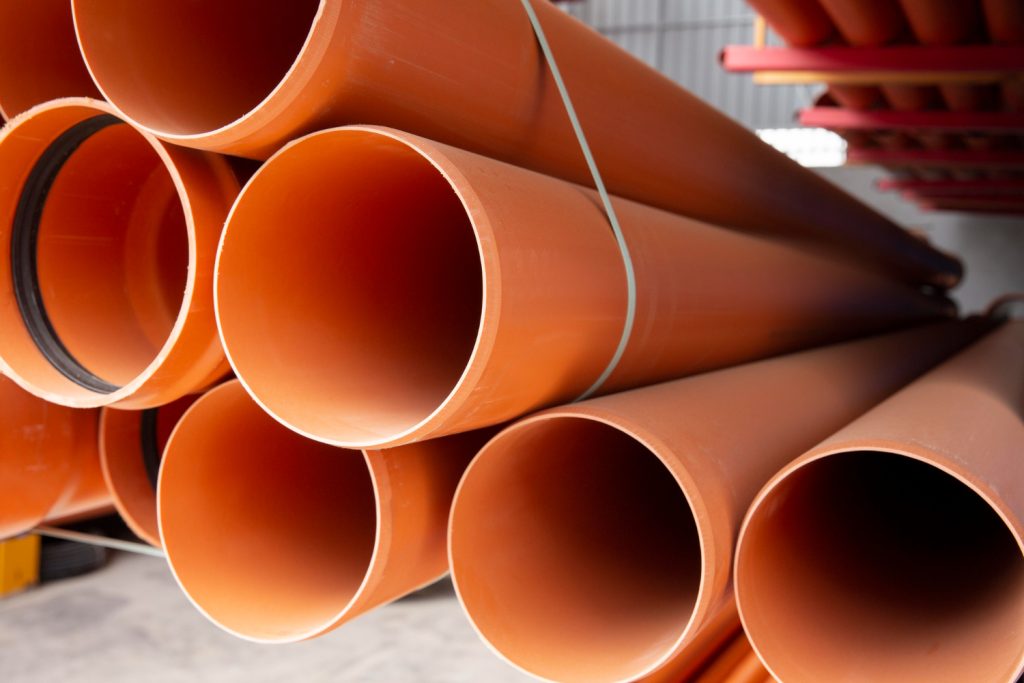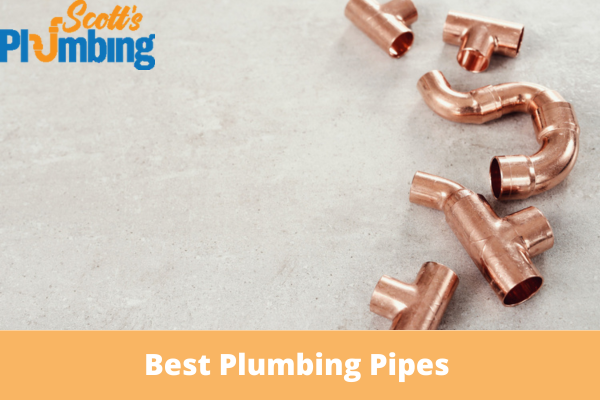Plumbing is an important but sometimes overlooked aspect of our homes. It discreetly contributes to our daily comfort by giving us fresh water for drinking and washing and carefully transporting garbage. The pipes that serve as conduits for these crucial operations are central to a well-functioning plumbing system. However, when choosing the best pipes for plumbing, the numerous alternatives available can be bewildering. In this post, let’s look at several types of plumbing pipes and their pros and limitations to choose which pipe is best for plumbing in your home.

What Kind Of Pipes Are Best For Plumbing?
Regarding plumbing installations, several types of pipes are to consider, each offering unique advantages and suitability for specific applications.
PEX Pipes: Flexibility Meets Durability
In recent years, PEX, or cross-linked polyethylene, has become a popular choice for residential plumbing. Known for its flexibility, PEX can be easily bent around corners and threaded through walls and floors, reducing the need for joints and fittings. It’s resistant to hot and cold temperatures, making it an excellent choice for water supply lines and underfloor heating. Plus, PEX doesn’t corrode, so you can bid goodbye to concerns about rust. However, PEX pipes can’t be used outdoors due to their susceptibility to UV damage, and they aren’t recyclable, posing an environmental concern.
PVC and CPVC Pipes: Lightweight and Cost-Effective
Polyvinyl Chloride (PVC) and Chlorinated Polyvinyl Chloride (CPVC) pipes are lightweight, inexpensive, and resistant to rust and corrosion. PVC pipes are great for high-pressure applications like the main water supply line. On the other hand, CPVC, treated with chlorine, is safe for transporting drinking water and can handle hotter temperatures, making it suitable for hot and cold water supply lines. The downside is that these pipes can’t handle very high temperatures and can potentially leach chemicals into the water.
Copper Pipes: The Classic Choice
Copper pipes have been the traditional choice for plumbing systems for many years, lauded for their longevity, heat tolerance, and ability to resist corrosion. These pipes are available in three different thickness grades – M, L, and DWV – for different uses. The chief downside of copper is its cost, as it’s significantly more expensive than most other options. Additionally, the installation process can be laborious due to the need for soldered joints.
Galvanized Steel Pipes: Old but Gold
Galvanized steel pipes, once the standard in residential plumbing, are used less frequently today due to their susceptibility to rust and corrosion over time. They’re made of steel and coated with a layer of zinc for protection. Though strong and durable, their relatively high cost and heavy weight make them less appealing than other modern options. However, they may still be found in some older homes.
ABS Pipes: A Dark Horse
Acrylonitrile Butadiene Styrene (ABS) pipes, easily identified by their black color, are mostly used in waste and vent lines. Like PVC in terms of ease of installation and cost-effectiveness, ABS pipes boast higher impact resistance, particularly in colder climates. However, they are not as widely accepted by plumbing codes, so always check local regulations before opting for ABS pipes.
Cast Iron Pipes: Strong but Cumbersome
Cast iron pipes, primarily used for waste and vent lines, are known for their durability and noise reduction – a useful quality if you don’t want to hear water rushing through your walls. However, their significant weight requires special support, and installation can be challenging. They’re also prone to rust over time and can be expensive.
How Long Do Plumbing Pipes Typically Last?
Plumbing pipe lifespan varies based on the pipe material, water quality, installation quality, and upkeep. Here’s a broad summary of the typical lifespans of several types of plumbing pipes:
- Copper pipes: Last around 50 years or more with proper installation and maintenance.
- PEX pipes: Expected to last approximately 40-50 years.
- PVC pipes: Last for about 25-40 years, depending on installation and exposure to sunlight.
- Galvanized steel pipes: Average lifespan ranges from 20-50 years.
- Cast iron pipes: Can last 50-100 years or more with proper maintenance.
Because these are generic estimations, examining particular conditions and aspects specific to your plumbing system is critical. Regular inspections, maintenance, and resolving concerns as they arise can all assist in extending the life of your pipes. It’s best to consult a professional plumber for precise assessments and specific advice.
Factors To Consider When Choosing The Best Pipes For Plumbing
When selecting the best pipes for plumbing, several key factors should be considered. The specific plumbing application is vital in determining the most suitable pipe material. Whether for water supply lines, drainage systems, or venting, different pipe materials have varying strengths and are designed for specific purposes. Secondly, consider the plumbing system’s water pressure requirements and desired flow rate. Certain pipe materials can handle higher pressures and offer better flow characteristics, ensuring efficient water distribution throughout the system.
Other factors to weigh include the temperature range the pipes will be exposed to, the durability and expected lifespan of the chosen material, budget constraints, local building codes and regulations, and the maintenance requirements of the pipes. Evaluating these factors in combination will help guide your decision-making and ensure that the pipe material best suits your plumbing needs. Consulting with a professional plumber can provide expert guidance tailored to your project’s requirements and ensure compliance with regulations.
Why Hire A Professional Plumber For Pipe Installation?
While some plumbing tasks can be DIY-friendly, hiring a professional plumber for pipe installation is often advisable. Professional plumbers have the expertise, experience, and knowledge to ensure proper sizing, installation techniques, and adherence to building codes. They can accurately assess your plumbing needs, recommend the most suitable pipe materials, and provide a reliable and efficient installation.
Hiring a professional plumber reduces the risk of errors, leaks, and potential damage to your plumbing system. Many experienced plumbers offer warranties or guarantees on their services to further reassure you.
Wrap Up
When choosing the best pipes for your plumbing needs, it’s crucial to consider various factors such as durability, corrosion resistance, ease of installation, and cost-effectiveness. While many choices exist, just a few truly stand out for their superior features and consistent quality.
No matter which pipe you choose, the experts at Scott’s Plumbing can guide you through the selection process, ensuring you make an informed decision that suits your needs. So, whether you’re a homeowner embarking on a renovation, a contractor working on a construction project, or a business owner seeking to upgrade your plumbing system, trust our team to deliver the best pipes in the industry. Our licensed plumbers have the expertise and reliable equipment to do the job right.
Trustworthy, reliable, and dedicated to your satisfaction—Scott’s Plumbing is the name you can rely on. Call now!



